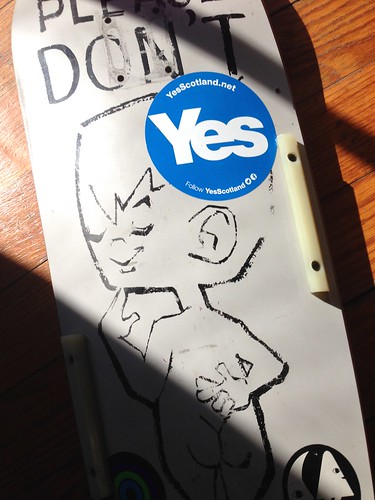
Given that we spend far too much on overly long, loud, and insubstantial political campaigns in the US, it was a bit difficult to get a gut-level feel for the progress toward tomorrow's Scottish independence referendum during my year there. For example, campaigning for the party nomination for Lieutenant Governor of Rhode Island -- a post truly devoid of power or responsibility -- is more visible in my neighborhood here (e.g., signs) than the independence vote was around Stirling when I left a month ago.
Not that there's anything wrong with that, but as an American I just kept thinking "If this is such a big deal, where are all the damn signs?"
Similarly, as far as I could see, I was the first person to slap a Yes sticker on his skateboard at the Stirling skatepark, and none of my mates there seemed very interested in discussing the matter. So about the only timely data point I can offer on the story is that on Facebook, the Stirling skate community has broken hard toward the Yes side in the past week. My intuition all year was that there just didn't seem to be the level of enthusiasm for Yes (e.g., can't even be arsed to stick up a wee sign) that would be necessary for such a momentous break. Now, it seems like there is real, late breaking momentum.
A couple other wee points:
- It is a weird thing to decide with what may be a 51/49% split. I'm in favor of Scottish independence, but it does seem like if ever there was a vote that required some level of supermajority (say, 60%), leaving the UK would be it.
- Not knowing much about the internal politics of the UK, I figured there would be some sense of kinship, alliance, and/or coordination between the non-English states in the union. There isn't. It is all about England. Nobody gives a shit about Wales or Northern Ireland. If Wales wanted to be independent, they should have won a few battles against Edward I.
In general, I agree with Charlie Stross:
In the long term I favour a Europe—indeed, a world—of much smaller states. I don't just favour breaking up the UK; I favour breaking up the United States, India, and China. Break up the Westphalian system. We live today in a world dominated by two types of group entity; the nation-states with defined borders and treaty obligations that emerged after the end of the 30 Years War, and the transnational corporate entities which thrive atop the free trade framework provided by the treaty organizations binding those Westphalian states together.
- I anticipated Paul Krugman's criticism of the Yes campaign. Independence without control over your currency is not only a terrible idea, but it skewed the terms of the debate, with the pro-independence people arguing all year in favor of giving England a stranglehold on their economy. It did a lot to dampen my interest and enthusiasm for the whole campaign.
- In general, at early on and from our limited perspective, more educated people seemed to be more pro-independence, while working class and low-income people seemed more dubious, which was confusing and not what you'd presume.
- Finally, 16 year olds can vote in this referendum. Cool!
No comments:
Post a Comment